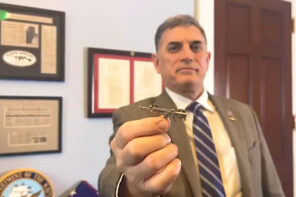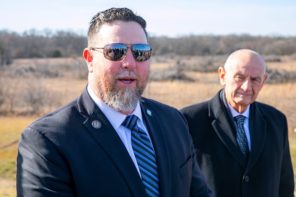Mr. President, it is a testament to the condition of our democracy that our own president uses words infamously spoken by Josef Stalin to describe his enemies. – Arizona Sen. Jeff Flake (R), Jan. 17, 2018
Last week, Sen. Jeff Flake (R-AZ) stood on the Senate floor and delivered a searing rebuke of President Trump’s continued assault on the legitimacy of mainstream news outlets. This is Flake’s second such address in six months. Last October, when he lambasted his Republican colleagues for their complicity in President Trump’s unraveling of civic norms, many saw Flake—a lifelong member of the Church of Jesus Christ of Latter-Day Saints—as channeling Mormon values and traditions.
In that earlier speech, Flake expressed his yearning for the United States to return to “an atmosphere of shared facts and shared values, comity and good faith.” As the New York Times observed in an article published after Flake’s speech, this sentiment had its roots in the Mormon zeal for “decorum.” By this account, Mormon prudishness, more than authentic outrage, was the prime motivator for Flake’s speech. This most recent speech, however, ventured far beyond mere calls for civility; it was a stand for the idea of truth and the practice of truth-telling.
Bookending the speech were a quotation from the Declaration of Independence (“We hold these truths to be self-evident . . .”) and the final stanza of a Mormon hymn (“O say, what is truth?”). For many, hearing such quotations alongside one another may seem jarring, especially coming from the floor of the United States Senate in service of an argument upholding “objective, empirical, evidence-based truth.” One of the virtues of Flake’s speech, however, is that it reminds us of the overlapping ideologies of early Mormonism and the American Revolution—Jefferson’s first draft of the Declaration, for instance, originally called those “self-evident” truths “sacred.” Mormonism, too, has always been a faith with a special taste for the empirical, which nourishes its sense of the profound interconnectedness of history, sacred reality, and everyday life. Even as Flake’s speech stuck up for the brute facts reported daily by journalists, he hinted several times at the theological underpinnings of his case (and its political implications) when he declared that “no matter how powerful, no president will ever have dominion over objective reality.”
The Mormon pursuit of objective reality is evident from its beginnings. In his youth, Joseph Smith, the founder of the LDS church, was deeply troubled by the contradictions among the various theological systems crowding his home along the banks of the Erie Canal. Like many seekers in the early 1800s, he ventured into the woods to query God for guidance. But where most prayed alone in the wilderness to have their hearts redeemed, Smith wanted a direct answer about which was the right religious path to follow. Nearly a decade later, after he had reportedly discovered the golden plates, he thrilled when others in the close-knit circle of early adherents corroborated his visions by also seeing the plates for the first time. He was so excited that he ran to his parents to tell them that God “has caused the plates to be shown to 3 more besides me who have also seen an angel and will have to testify to the truth of what I have said for they know for themselves that I do not go about to deceive the people.”
Whatever one believes about the facts in this case, what can not be denied is that a hunger for evidence and corroboration is essential to the Book of Mormon as both a text and an event. Part of its immense fascination for believers and skeptics alike has been its grounding in material (or artifactual) reality. For many, both then and now, the book was physical proof that God still anointed prophets, that sacred reality still penetrated everyday life, and that this continent had not been excluded from any divine plan. As Smith’s biographer Richard Bushman writes, the Book of Mormon’s “historicity is the foundation for believing that Joseph Smith was commissioned by God.” Smith seems to have thought so, too, given the eagerness with which he sought scholarly confirmation of the Book of Mormon’s authenticity and provenance.
Most pertinent to Flake’s speech, though, is what’s in the Book of Mormon, a narrative brimming with prophets, whose raison d’etre seems at times to be reiterating the existence of an “objective reality” over the distortionary claims of religious and political schemers. Which is not to say the book is in any way a harbinger of liberal democracy; pluralism, religious or otherwise, is often a recipe for chaos and deceit in the Book of Mormon’s world. Nevertheless, from minor local scandals to cosmically significant events, the book is preoccupied with dramatizing the multitude of ways in which truth outs.
One sequence that seems particularly illustrative of the relationship between Flake’s public rhetoric and Mormon scripture occurs not long before the appearance of Christ among the Nephites, when a group of bandits murders a chief judge and his son, paving the way for their secret society to wrest control of Nephite government. As the retired chief judge Nephi (a descendant of the original Nephi) sees this process slowly unfold, he begins pouring out lamentations from the top of a tower. Speaking not as a former politician but as a prophet, he urges his listeners to embrace the truths of the past. “Ye have rejected all these things,” he chastises, “notwithstanding so many evidences which ye have received.” Although his jeremiad is largely concerned with the failure to remember ancient prophecies, Nephi does not ignore the hard and contemptible facts of the present. Like a prophet-journalist, he concludes his speech by revealing detailed information to the public about the murder of yet another government official.
It’s hard to avoid drawing parallels between this episode and Flake’s speech: a faithful member of the church speaking from a tower (perhaps the Nephite equivalent of C-SPAN) about the importance of remembering the value and meaning of evidence, truth, and the wisdom of foundational texts to a public whose corrupt government is under suspicion of criminal activity. The difference between the two, however, is that the prophet did not merely champion truth; he revealed it, with full knowledge of the risks of doing so.
Both the Declaration of Independence and the Book of Mormon were actions as well as texts. They were attempts to realize truth through public speech. Unlike his earlier address, which merely skimmed the surface of his Mormon heritage, the value of Flake’s latest was that it recovered and entered into the public record some of Mormonism’s key epistemological assumptions and set them in relation to the nation’s founding documents. The question remains, however, whether this address is more style than substance. Does it reflect Flake’s genuine commitment to upholding and outing truth, or will it prove wholly performative?
As Flake’s tenure in the Senate approaches its end, he has promised to give more speeches, some focused on policy and others on the health of the polity and the character of the president. In an interview Flake gave to the Atlantic last week, he made no effort to hide the fact that his voting record has so far aligned perfectly with the president’s agenda, although he assured readers that he has been working with his fellow legislators behind the scenes to rein in the more egregious excesses of the current administration. Of course, Flake told McKay Coppins that, “on tax cuts, I mean, look at my book. I’ve been all about that for a long time,” despite the fact that the trickle-down theory at the heart of those tax cuts does not, empirically speaking, boost the economy or reduce the national debt.
Still, one hopes that that old Mormon commitment to ferociously pursuing truths both sacred and mundane will animate Flake’s final months as a Senator; that speeches like this will lead, if necessary, to courageous action.
Flake devoted much of his speech to honoring the immense sacrifices journalists have made in their pursuit of truth; hopefully he is also willing to make profound sacrifices of his own.





